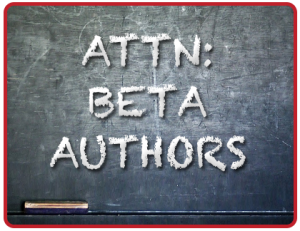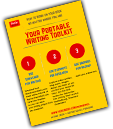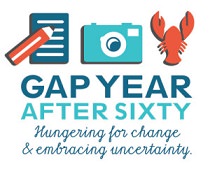How preparing a 5-minute Ignite talk is like writing a short book
 Riddle: how is a 5-minute Ignite talk like a short eBook?
Riddle: how is a 5-minute Ignite talk like a short eBook?
Both are condensed, both are challenging to create. Giving a five-minute Ignite talk (they’re like mini TED talks) is a tricky performance: your slides advance automatically every 15 seconds and your words have to match up. Five minutes – and 20 slides – is not much time to get across your idea.
But it’s plenty of time to fumble your speech as you race through the slides rotating in front of you. I did my second Ignite talk recently and even though I practiced dozens (and dozens) of times, I blanked on one slide and couldn’t remember my script. Eek. Loads of adrenaline. The audience didn’t seem to care.
How preparing a short talk is like writing a short book
But back to the parallel between a short talk and a short book. Yes, both contain fewer words. A typical full-length business book is about 50,000 words. A short eBook can be as short as 30 pages or fewer than 10,000 words.
The more important similarity is that both require strenuous brainstorming – followed by a winnowing process – to figure out what your story or message is and to tell it in the most economical and compelling way. This is the fun part.
It takes longer than you think
It took me almost two weeks to write my Ignite talk on Short Is the New Long. Final word count: about 750. The narrowing down process meant combining strategic and big picture advice about the eBook revolution with a few specific, tactical tips. See my slides below.
To uncover what a short book is really about can take much longer than several weeks. You have to dig deep to find a provocative and interesting way to structure your story. Some of the best business books are built on a recognizable framework. The Top 100… or Ten Steps to… See executive coach Karen Wright’s new book: The Complete Executive: the 10-Step System for Great Leadership Performance.
You need to kitchen sink your idea
I ran across this marvelous phrase on Jane Friedman’s blog. She points out that bestselling author Josh Swiller has turned kitchen sink into a verb.
He writes:
Kitchen sink that first draft. Throw every damn thing in there. If you aren’t sure something belongs, if you aren’t even remotely clear what the point of a certain tangent is—in it goes. It can help to do this draft with pen and paper, in poor handwriting, so you can’t be eying and judging what you’ve put down as you go along… And throughout the process, please recognize and celebrate the fact that writing is completely ridiculous.
– Josh Swiller’s 12 Tips on Writing for GlimmerTrain
Brainstorming, dumping and winnowing
So that’s my advice if you’re considering writing a short book (or giving an Ignite talk). Dump everything out. Be sure to give yourself enough time to do it. Then step back and see which ideas connect to what. What is important and what is tangential? In some ways, this is the hardest part of writing: getting everything out while silencing your critical, inner editor. The results may surprise and delight you.
Oh and a heads up: this kind of brainstorming, dumping and winnowing is one of the things we do in my Beta Author Boost program. If you want to be the first to hear when the next session opens, sign up here.
My Ignite slides with audio
Below are my slides with the audio added. Note: it’s not a recording of the live performance. I recorded and uploaded the audio later which is a neat feature of SlideShare.
Useful Links
My first Ignite talk plus resources for preparing an Ignite presentation (scroll to bottom)
Jonathan Fields’ interview with Karen Wright on her new book
Want help writing a short book?
 Want support, inspiration and a tough love coach to help you write a short eBook by the end of 2012? Registration for my redesigned and enhanced Beta Author Boost program opens soon. Enrollment is limited so I invite you to sign up below if you want more information and first dibs on the early-bird prices. New this fall: there are three pricing levels to accommodate your budget and time constraints.
Want support, inspiration and a tough love coach to help you write a short eBook by the end of 2012? Registration for my redesigned and enhanced Beta Author Boost program opens soon. Enrollment is limited so I invite you to sign up below if you want more information and first dibs on the early-bird prices. New this fall: there are three pricing levels to accommodate your budget and time constraints.


 Want to reinvent your life and work after age 60? Follow Sam and me as we reinvent a yin yang life on the coast of Maine and in Brooklyn.
Want to reinvent your life and work after age 60? Follow Sam and me as we reinvent a yin yang life on the coast of Maine and in Brooklyn.







